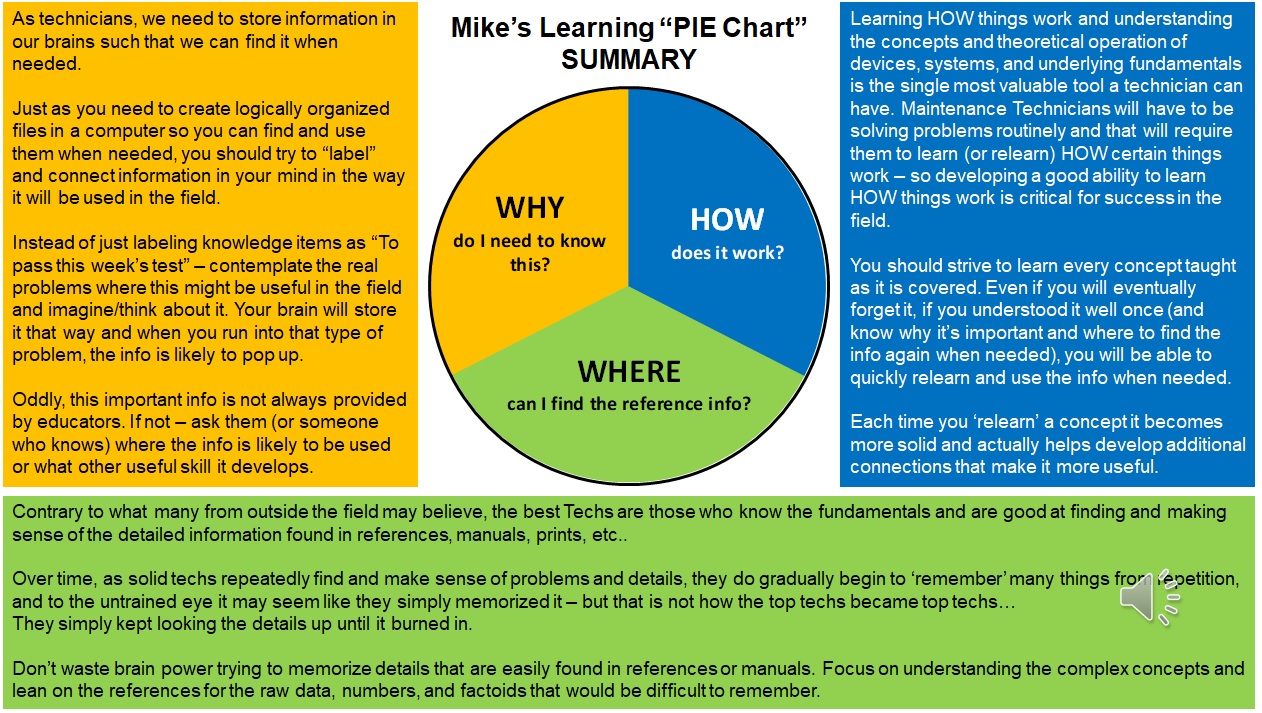Tips - Learning Technical Skills
Hi, I am Mike Glass with Orion Technical Solutions. Today I am going to give some tips on learning and/or teaching folks in technical roles. I have been assessing and teaching I&E techs mainly for most of my career and I’ve focused in on certain mistakes that people make in teaching and learning in these fields and similar fields that can easily be corrected, and I’d like to share some guidance that will help people reach greater success in these particular areas. The target audience for this is students, but I am also hoping this will help educators, mentors, or even managers charged with developing their technicians. This won't apply to all situations, but it should be helpful for nearly anyone involved with maintenance technicians, technical roles, etc.
The first thing I would need to do is explain how the brain actually learns and uses that information.
When we learn things, our brains are establishing connections between nodes (neurons). The pathways between those nodes dictate how that information is shared and used.
Our brains are constantly trying to prove the efficiency of those connections, and of that traffic flow, between the various nodes of information that we utilize (much like a network traffic monitor works). If you have ever worked with a network traffic monitor, some of the monitors are really good at figuring out the best way to get information from point A to point Z and our brains are doing that on a massive scale. We don’t even realize it's doing it. But depending on how we learn and help set that up, establish that, and make that more efficient. And that is really what the focus of this discussion is.
The more connections we make between those nodes the more closely we can pattern that to the actual work that we are doing and use the information more efficiently (ie the more successful we will be able to be).
Tip #1 - Don’t Overuse Memorization
The first tip in this is don’t overuse memorization. That is the number one thing I see people do wrong and it's hard to fix. It is hard to get somebody who is nervous and thinks they have been trained to lean on memorization, short-term memorization especially.
The idea is that you have to memorize this and pass the test for the coupon on Monday. In technical fields, the coupon never works out. If you don't have the skills, it’s going to catch up with you and be a problem. So you really have to be able to understand and use the information and use the material. The most skilled technicians are nearly always the ones who can find, use, relearn, and apply information. It is a requirement that you have a photographic memory to be a really incredible technician. And that is a misconception some people have. The best technicians I have seen don't try to sit down and memorize it, they understand how it works and they program their brain to use that information sometimes by accident, but that is what ends up making them good.
If you are a mentor and educator and if you are helping a technician, new student, etc. Be sure to help them understand how you learn the things you teaching or help them pick up how and why you remember certain things, so they don’t get the misconception you sat down and memorized it. And then they waste time and energy getting beat up and tied down trying to cram and remember things that are gonna come naturally over time. That is a very common weakness and I see a lot of people get really frustrated and struggle because of that.
Tip #2 - Mike’s learning PIE Chart

The second tip I am going to give is really several pieces. I call it the learning PIE chart and it is very helpful in any technical field. It’s three questions that you need to ask about any topic you are learning about. What this does is help you craft new knowledge into your brain in such a way that is useful to you in the field. Which is ultimately the goal of any technical training. So, let’s jump into that.
This chart is what you should be asking in some lessons. These will help you build those connections properly such that the information is going to be actually useful to you.
Part 1 - Why do I need to Know This?
The first part is why do I need to know this? That isn't to say do I need to know this? If your teachers are teaching it just know that you need to be able to learn it. Sometimes teachers teach stuff just because someone made them learn it and now they are going to make you learn it. I’ve seen it happen. But I have never seen someone hurt by that. Sometimes you learn things and you may not use them, but it might help you in other ways. Our brains are an amazing tool and it can do some pretty amazing stuff. So when you are doing this try to figure out where am I going to use this information? If your instructor isn’t comfortable telling you that, find someone else to tell you. I, myself, love when students ask that question. They say, “Where would I ever use this?” because that tells me they want to know how to use this in the field, and that’s a good thing. If you can get them to think long-term in the field instead of this week's test they are more likely to put this in a way that it is gonna stick and they will retain it. And when they get into that problem and they are dealing with that thing their brain is going to have kind of a connection to that. Every time they use that it is going to reaffirm to other things that are sort of related to that. And pretty soon they are going to instantly be able to find that information. That is the high-skill tech. That is what we are all shooting for. So educators, mentors if someone asks you why, just tell them why. If you don’t have a good justification yourself, talk to other experts. Reach out to me. Super valuable information in the process.
Part 2 - Where can I find reference information or details when needed?
The next part is where can I find the reference information or the details when needed. Contrary to what some outsiders may think, the best technicians are those who just know the fundamentals and are really good at making sense of detailed information. Over time they will repeatedly use certain parts of information and they will remember it. They never sat down and memorized it, but they will remember it because they have got to apply this tool. That pathway between those neurons has been burned into where they use it often enough, it's solid. But that is how they initially learned it and eventually let the natural remembering thing happen. I use the example of driving somewhere you don’t sit and memorize every turn, you use the GPS, and eventually you don’t need the GPS. You’ve been to that place so many times you already know the way. Let that happen. And let the manuals do what they do. Manuals are good for containing raw data and numbers, factoids, and details and you really should use the manuals for that. Don’t avoid using the manuals in critical high-risk environments it could be dangerous and kill people if you are one number off. Always use the manuals.
Part 3 - How does this (device, concept, system, circuit) work?
The third part is how this device, system, concept, and circuit work. Learning how something actually works is the key to this whole field, you’ve got to be good at this. You’re going to be solving problems every day you may not have worked in a while and you are going to have to learn and relearn. That is part of the process. You should strive to fully understand every concept as it is covered. If you do that, and you that good notes and use references, when you need that again you will be able to go back to it and relearn it quicker. If you really understood it. I have seen this thousands of times with students. The ones that really learned it and understood it somehow magically learned it really quickly. The ones that just got through Friday’s test end up guessing or making mistakes.
All of these pieces of the learning pie chart are crucial to produce actual skills improvements, and they all work together.

